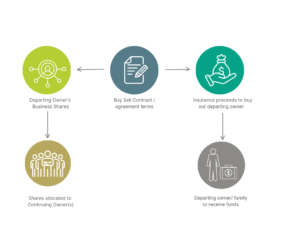In the business world, unforeseen events can swiftly reshape our path, urging quick adaptation. At Morrows, we’ve personally experienced the weight of this truth following the unexpected passing of our chairman and director in 2021. This event highlighted the importance of succession planning, a lesson that extends beyond our firm.
Running a successful business is no easy feat. It requires dedication, hard work, and a team of dedicated individuals who share a common goal. However, have you ever asked yourself what would happen if one of the key players in your business suddenly exited due to unforeseen circumstances such as death or disability? Here is where business succession planning, coupled with insurance, becomes imperative.
The Foundation: Business Succession Agreement
A well-thought-out business succession plan has two core components: a business succession agreement and a funding mechanism. These two pillars must be structured together to ensure the seamless continuation of business operations in the event of a key person’s departure.
- Business Succession Agreement
This legally binding contract outlines the procedures for transferring ownership in the event of specific triggering events, such as the death, total and permanent disablement of one or more business owners. This agreement establishes the framework for a smooth transition and also protects the interests of all parties involved, including the departing owner’s family. - Funding Mechanism
While the agreement sets the rules, the funding mechanism provides the means to execute the agreement effectively. Three main options exist to fund the agreement; selling assets, borrowing capital, or utilising buy-sell insurance.
Among these, buy-sell insurance often emerges as the most efficient and reliable source of capital to meet the buy/sell obligations of the business succession plan, especially in cases of death, disability, or trauma.
Advantages of Choosing Insurance for Funding
Investing in Buy-Sell insurance as the funding source offers several distinct advantages:
- Efficiency: Insurance ensures that adequate funds are readily available when needed, mitigating the risk of financial strain on the business or its owners.
- Equity Protection: Insurance allows remaining owners to acquire the interests of the departing owner promptly, preserving the stability of the business and its continuity.
- Debt Elimination: It enables the permanent cancellation of personal guarantees by eliminating the need for borrowings, thus reducing financial vulnerability.
Here is an illustration that explains how it works:

Funding Options in Business Succession Planning
When considering how to fund a business succession plan, several options exist, each with its own set of implications:
- Liquidate the Business: This involves selling the business entirely, which may not be ideal if you wish to preserve the business’s legacy.
- Take on a New Equity Holder: Bringing in a new partner may introduce complications regarding expertise and alignment with business objectives.
- Accumulate a Reserve: Building sufficient funds over time can be slow and capital-intensive.
- Borrow the Money: Traditional financial institutions might hesitate to lend to a business that has recently lost a key owner.
- Business Equity Insurance: This option involves paying insurance premiums, which can be a cost-effective way to protect the business and its owners.
The importance of seeking legal advice as part of this business succession process
While business succession planning with insurance offers significant benefits, it is crucial to consider it carefully. We recommend that clients seek legal advice to:
- Establish a well-structured business succession agreement consistent with your objectives.
- Update personal wills to ensure efficient asset distribution in the event of death.
- Ensure a clear agreement is in place to avoid insurance proceeds being paid to the departing owner without the remaining owners gaining control of the business.
- Create an Enduring Power of Attorney for managing affairs in case of incapacitation.
- Review trust deeds for owners using family trusts as part of the business protection plan.
How Morrows Risk Insurance can help
Morrows Risk Insurance is here to help you understand the options and guide you to ensure you and your business have adequate coverage for the unexpected. Our team will;
- Facilitate engagement and implementation of the agreement with specialist lawyers.
- Advise you on the most appropriate insurance policies to fulfill funding needs, including identifying what cover is cost-competitive compared to alternatives.
- Help address any taxation and business structure implications.
- Regularly review the value of your business to ensure insurance levels remain adequate.
- Explore alternative funding mechanisms for non-insurable events or owners who cannot obtain insurance on similar terms.
Business succession planning is not just a necessary measure; it is a critical necessity for ensuring the stability and continuity of your business in the face of unexpected events. When coupled with insurance, it provides a robust safety net, safeguarding the interests of business owners and their people. Contact your advisor today for more information on how we can help.





